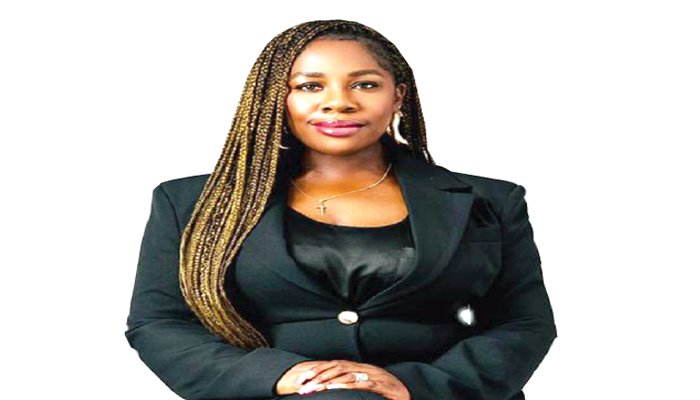
Chief Executive Officer of TRITEK Consulting Limited, Adeshola Alegbe, tells TEMITOPE ADETUNJI how discrimination in the workspace and a challenging childhood triggered her interest in entrepreneurship
What is the story behind your firm, TRITEK Consulting Limited, which has become a success today?
Having worked in the banking sector for over 10 years, I got tired of the work politics and the lack of career progression within that environment. I felt very limited and frustrated. As a result, I decided to pursue a career in tech and that’s when my passion for mentoring came about. I had information technology training in a well-established school and I began to mentor their students in careers in the IT sector. I had huge success within that company and that motivated me to start my own business. I started TRITEK in 2017 and honestly didn’t have a vision of how big the company will get. For me, it was just something to help pay the bills.
What has the experience been like for you as a Nigerian running a company in the UK?
I was born in the UK so I have an understanding of what the requirements are to work in the UK. However, as a proud Nigerian, I am ecstatic about helping, in particular, the Nigerian community in a foreign land. Yes, there have been challenges as with any business but overall, it’s been a very rewarding experience. Also, being recognised by UK establishments for our achievements shows that we are definitely doing something right.
When people talk about the UK, they also talk in terms of high taxation. How does that relate to your business?
You have to pay your dues. As an entrepreneur, you must be ready to obey the laws of the land. Nobody likes to pay taxes but it is something that we have to do. It’s imperative that we do things properly and ensure our books are properly updated so that we don’t face severe consequences in the future.
For a lot of Nigerians who relocated abroad in search of greener pastures, there is usually a story of humble beginnings. Is this an experience you can relate to?
Yes, and this is why I’m so happy that nowadays a lot of immigrants want to go straight into tech as opposed to just doing odd jobs. I have worked as a housekeeper, and chambermaid, at a Jewish bakery, as a cleaner, and at a gambling company. It doesn’t get any more humble than that! I guess all these experiences I’ve had enabled me to appreciate what I’m doing now and become more passionate about helping the community with their careers.
Did you experience any form of racism or discrimination?
I wouldn’t say racism. I don’t like to use that word a lot but, definitely, discrimination. I experienced this while working in a bank for 10 years and that prompted me to start a career in tech. When you’re stuck in a situation where your voice isn’t heard or there are no opportunities for progression, you become frustrated and a shadow of your former self but I am grateful because that made me stronger and more determined than ever to succeed.
Can you take us through your education and how your interest in IT began?
I had my primary education in Birmingham and as a somewhat difficult child, my parents made the decision to send me to Nigeria and that was where I continued with my secondary education. I also had my university education in Nigeria and was not allowed to return to the UK until my parents were convinced that I had changed. The educational system in Nigeria is way more advanced and, of course, a lot more strict. I struggled in the first few years with the high standards within the educational sector and the very strict culture. It was a culture shock for me.
What was childhood like for you?
It was challenging because I was with foster parents at the age of two.
How challenging was it?
It was a very strict and abusive childhood and I was subjected to a lot of racism because of the colour of my skin and my facial features. I was the only black person in my school and the area that I lived so every day was me trying to survive, belong and stick up for myself, especially with the constant bullying that I received but this has made me the strong person I am today.
How were you able to rise above the challenges you faced growing up?
Relocating to Nigeria was a huge blessing for me and it opened my eyes to so many opportunities but ultimately, just having a fixed skin, fighting for what I believe in, and sticking up for myself.
What is that decision that you made, which you are always grateful for because you consider it as the turning point of your life?
My best decision was to leave banking after 10 years of feeling unfulfilled and that was a turning point for my career in tech. Establishing my business is also a decision I am grateful for. It was a huge sacrifice but is a sacrifice that has paid off in the end.
Yours is a story of resilience. Who did you get that resilience streak from, your mom or dad?
I will say both. My mum is a very strong, hardworking woman. She has worked all her life and is still working and she comes from a family of very strong, independent women. My dad was also a very strong character and I believe I got that from him.
What is the biggest lesson that life has taught you?
Nothing lasts forever. No situation lasts forever. Run your race and don’t compare your success to others. Your own time will come.
What do you consider the highlights of your career so far?
The biggest highlight for me is the multiple awards I have won, including a woman of the year award in 2018 and an emerging CEO of the year award in 2022, and also just the fact that God is using me to help so many people with their career goals. That, in itself, is the best feeling in the world.
What is the ultimate goal for you?
The ultimate goal is to be the best that I can ever be. To continue to help people more than ever before and to ensure that as the proud Nigerian that I am, our people are taking over the tech space.
For Nigerians who are new immigrants in the UK, what is the advice you offer?
They should not subject themselves to minimal jobs just because everyone else is doing it or their families tell them it is the only way. The world has changed drastically. Nigerians are getting employed more than ever before in tech. So, do not limit yourself. Have big career goals and aspirations and follow them through.
Is there a possibility that you might have a business in Nigeria?
Due to COVID, all of my training is online now, so I have a wired audience globally but, at some point, I will like to have another kind of business within my homeland.





